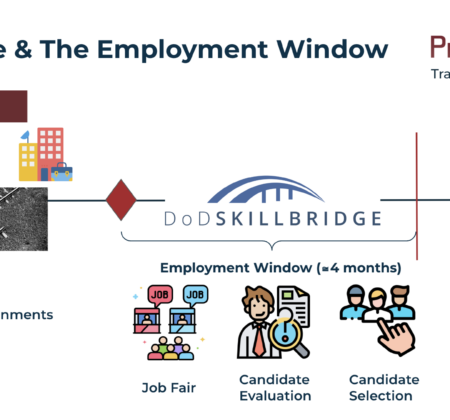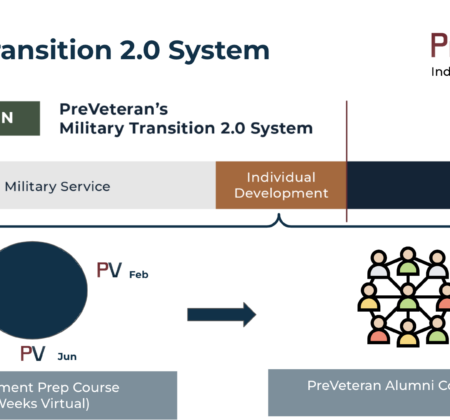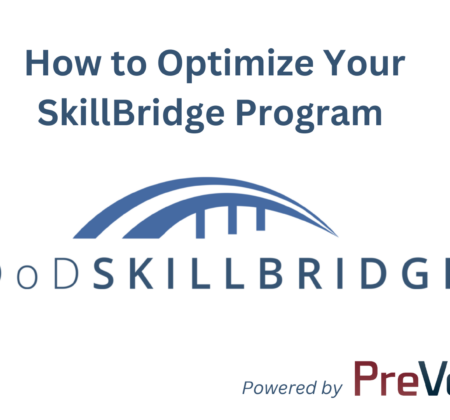New Words for PreVeteran’s Military Transition 2.0 Model
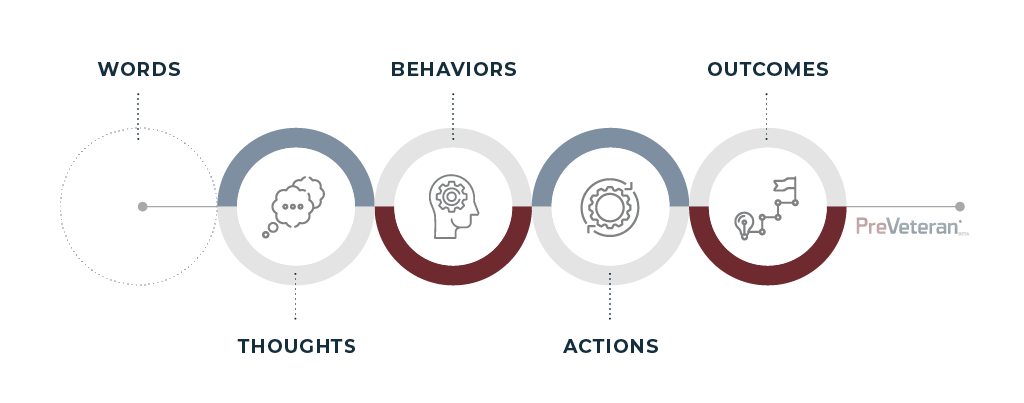
In a previous article, we discussed how our new PreVeteran Military Transition 2.0 model helps military members and military spouses better prepare for post-military employment. From a practical perspective, our model provides two key things that the current 1.0 model does not—it gives the service member and military spouse sufficient time and an individual training component.
As part of our individual training component, PreVeteran helps the service member and military spouse orient, navigate, and iterate their way to successful post-military employment.

Part of the orientation process is to help them understand their thinking process as they head into the military transition environment where the quality of their decision making process will determine, to a large extent, how successful they’ll be once they leave the military.
At PreVeteran, we believe one of the challenges associated with quality decision making stems from the lack of adequate language needed to describe the overall transition process.
So, in this article, we’re going to walk you through basic cognitive neuroscience principles, why language is so important to thinking, and then provide new PreVeteran language that we believe accurately describes the thinking and behavior taking place in the military transition space.
Basic Cognitive Neuroscience Principles
PreVeteran’s methodology and programs are built on cognitive neuroscience principles. Our founder Jason C. Anderson did this purposefully because he believes there’s nothing more individual than how each unique brain processes information from the external environment to make decisions and drive outcomes. In fact, he hired a cognitive neuroscience expert back in 2017-2018 to validate our new PreVeteran proprietary models.
To keep cognitive neuroscience principles at a high but practical level, there are two key aspects we want to make you aware of.
- Thoughts matter
- Human brains depend on long-term memories to draw from to help the individual think and make decisions
Thoughts matter because of the linkage shown below. Thoughts drive behaviors, behaviors drive actions, and actions drive outcomes.
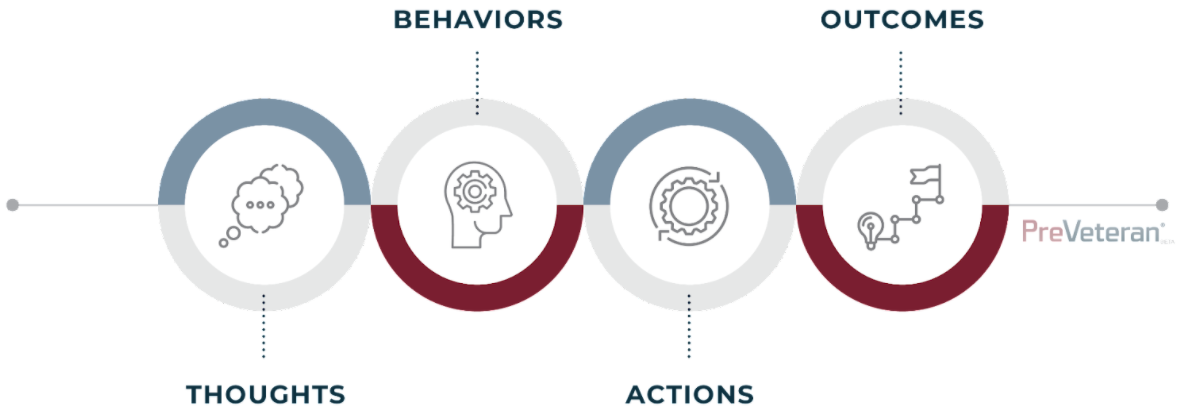
Long-term memories matter because the human experience is captured in the form of individual memories. So, when an individual faces a current challenge or set of circumstances, their brain will try to leverage (or recall) those memories for re-use in the thinking process.
Language and Words Are Critical to Thinking
Language and words are some of the primary tools humans have to observe, think and perceive our world. They aren’t just a collection of random letters, words, and sentences strung together on a document or computer screen for your viewing pleasure. Language and words carry meaning to help us anchor our thoughts to tangible things around us so we can better understand—and operate—in the world around us.
In other words, words will shape our thoughts, which will in turn drive our behaviors, actions, and outcomes.

At PreVeteran, our contention is that the current Military Transition 1.0 model lacks the needed language and wording to sufficiently describe individual behaviors associated with military transition. In a practical sense, this means that the service member is missing a big self-awareness tool that can help them examine their thoughts and then determine if they are productive or unproductive to their post-military success.
Two New Words for PreVeteran’s Military Transition 2.0 Model
We’d like to introduce you to two new words PreVeteran created that accurately describes the servicemember and military spouses’ thinking as they enter into transition and why they’re thinking that way.
Since the human brain leverages long-term memories to think through current challenges, nearly all service members and military spouses will have a spectrum of long-term memories when it comes to military transition. This memory spectrum ranges from no long-term memory—something we call the Brain Gap—to a
plethora of military-related memory—something we call the Military Mindset Heuristic.

Let’s go through each one of these new words and explain why they can be so insightful to individual service members and military spouses to help them think more clearly and make better decisions when it comes to their transition planning.
New Word #1—The Brain Gap (BG)
The Brain Gap occurs because the transitioning military member and military spouse have no long-term memory to draw from when thinking through transition.
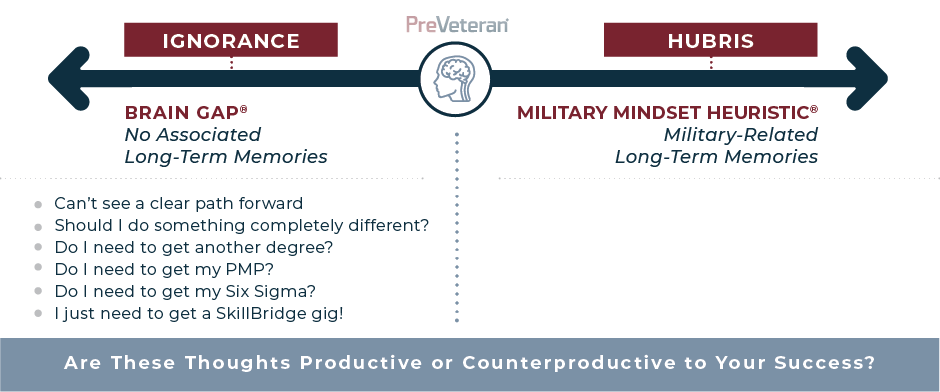
With no long-term memory to draw from, their brain is unable to complete a cognitive cycle and therefore, they cannot think fully through how to plan for their military transition. Post-military transition survey respondents articulate this phenomenon as “not being able to see a clear path forward.” This can be particularly frustrating for Type A, driven military members who are used to seeing a clear path forward in complex military missions. Not in this case, unfortunately.
Because their brains cannot complete a cognitive cycle, what they don’t know is that their brain—without their volition—will then seek information from the external environment to fill those gaps. This is where the following information enters their thinking cycle.
- Should I do something different?
- Do I need to get my PMP?
- Do I need to get my Six Sigma?
- Should I use my GI Bill to “figure out” transition?
- I just need to land a SkillBridge!
This makes thinking challenging, and exhausting, because these messages will encourage them to pursue one, if not all, of these thought “leads” with no certainty these “leads” will deliver the outcomes they seek.
New Word #2—The Military Mindset Heuristic (MMH)
While the Brain Gap is problematic from a “noise” in the mind and diversion of energy and resources standpoint, the Military Mindset Heuristic is much more problematic for the following reason. Heuristics are shortcut neural pathways in your mind that will deliver you steadfast and assertive determinations and judgements to your mind without any active thinking on your part. These thoughts just pop into your mind.
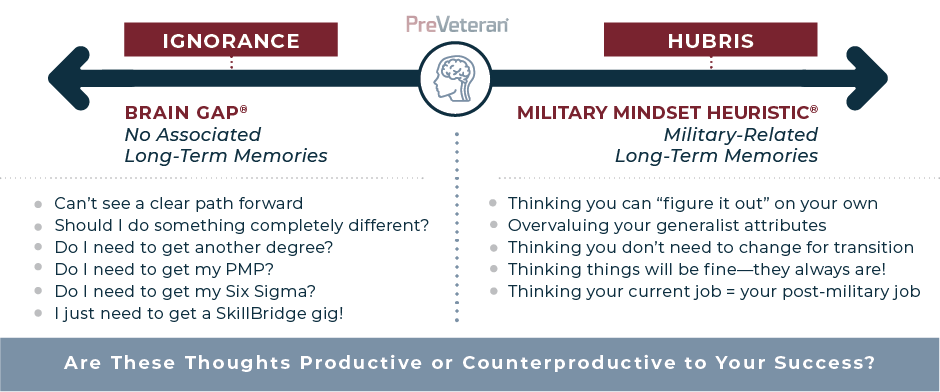
These heuristics that pop into your mind are the result of doing years of cognitive cycles within the military ecosystem. These heuristics can also be pernicious for post-military environment success because the military ecosystem and non-military environments are so different. In other words, these auto-generated thoughts may, or may not, serve you well in the post-military world.
Some examples of Military Mindset Heuristic-generated thoughts that just pop into your mind are:
- I can figure out transition on my own
- The private sector needs a generalist
- I don’t need to change
- Things will work out fine—they always have.
What’s interesting about the MMH-generated thoughts are that, while they come across convincing to the military member, they tend to fall apart quickly when that individual is asked follow-on questions beyond the surface-level heuristic.
We Encourage You to Start Using These New Words
Our PreVeteran mission is to make more successful veterans, one PreVeteran at a time. Helping define this space in much more specific terms is a critical enabler to help the individual service member and military spouse orient themselves, and the organizations seeking to help these individuals.
Join us by starting to use these words to more accurately describe the thoughts and behaviors emanating from the military transition space. The ability to put another level of detail into describing this human behavior will go a long way in making the system and the output from that system much more functional and successful.
Are you a military member or military spouses who wants to know how your current post-military preparation efforts stack up? We encourage you to take our Employment Readiness Quiz.
Are you an organization that wants to learn more about how you can use our proprietary modeling and programming to improve your existing transition programs? Email us at info@preveteran.com and we’ll get back to you right away.
PreVeteran is a company committed to helping military members and their families better prepare themselves for post-military employment in the private sector. PreVeteran takes a highly individual, cognitive neuroscience-based approach to this challenge by helping these individuals regain autonomy in their thinking and decision-making process. If you’re interested in learning more about our approach, contact us at info@preveteran.com and someone will get back to you right away.
